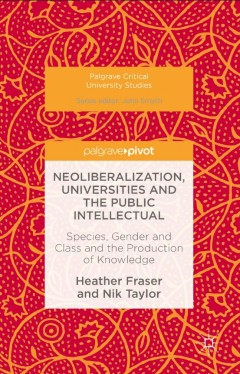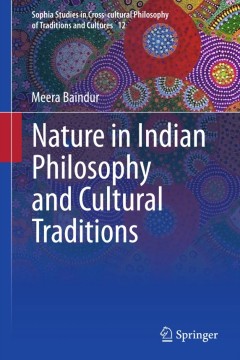Filter by

Neuroenhancement: how mental training and meditation can promote epistemic vi…
This book explores how one can bring about changes in the brain through meditation, both through attention-focus training and through compassion training. Recent findings in the natural sciences have confirmed that it is possible for humans to achieve these structural and functional changes through various life-style practices. It is argued that meditation enables us to influence some aspects o…
- Edition
- 1
- ISBN/ISSN
- 978-3-319-23516-5
- Collation
- XI, 110
- Series Title
- SpringerBriefs in Ethics
- Call Number
- -

Neoliberalization, Universities and the Public Intellectual
This book employs an an intersectional feminist approach to highlight how research and teaching agendas are being skewed by commercialized, corporatized and commodified values and assumptions implicit in the neoliberalization of the academy. The authors combine 50 years of academic experience and focus on species, gender and class as they document the hazardous consequences of seeing people as …
- Edition
- 1
- ISBN/ISSN
- 978-1-137-57908-9
- Collation
- XIII, 142
- Series Title
- Palgrave Critical University Studies
- Call Number
- -

The “New Culture” From a Modern Perspective
Contemporary China, in an era of globalization and in the midst of transition, now faces both great opportunities and unprecedented challenges. People are more and more becoming “economic man,” “technological man” and “one-dimensional man,” and are increasingly losing the virtue, dignity and beauty of human nature. When humanity’s habitat grows smaller and smaller as economic, tec…
- Edition
- -
- ISBN/ISSN
- 978-3-662-48011-3
- Collation
- -
- Series Title
- -
- Call Number
- -

Nanotechnology and Ethical Governance in the European Union and China
This book addresses questions surrounding the feasibility of a global approach to ethical governance of science and technology. The emergence and rapid spread of nanotechnology offers a test case for how the world might act when confronted with a technology that could transform the global economy and provide solutions to issues such as pollution, while potentially creating new environmental and…
- Edition
- 1
- ISBN/ISSN
- 978-3-319-18232-2
- Collation
- XII, 227
- Series Title
- -
- Call Number
- -

The Vienna Circle : Studies in the Origins, Development, and Influence of Log…
This abridged and revised edition of the original book (Springer-Wien-New York: 2001) offers the only comprehensive history and documentation of the Vienna Circle based on new sources with an innovative historiographical approach to the study of science. With reference to previously unpublished archival material and more recent literature, it refutes a number of widespread clichés about "neo-p…
- Edition
- -
- ISBN/ISSN
- 978-3-319-16561-5
- Collation
- -
- Series Title
- -
- Call Number
- -

Nature in Indian Philosophy and Cultural Traditions
Working within a framework of environmental philosophy and environmental ethics, this book describes and postulates alternative understandings of nature in Indian traditions of thought, particularly philosophy. The interest in alternative conceptualizations of nature has gained significance after many thinkers pointed out that attitudes to the environment are determined to a large extent by our…
- Edition
- 1
- ISBN/ISSN
- 978-81-322-2999-5
- Collation
- XV, 219
- Series Title
- Sophia Studies in Cross-cultural Philosophy of Traditions and Cultures
- Call Number
- -

Murder on the Einstein Express and Other Stories
This collection of stories touches upon many genres: Normed Trek is a clever and witty Alice-in-Wonderland-type narrative set in the realm of mathematical analysis, The Cantor Trilogy is a dystopia about the consequences of relying upon computer-based mathematical proofs, In Search of Future Time bears the flavor of Tales from Arabian Nights set in the future, and – last but not least - Murde…
- Edition
- 1
- ISBN/ISSN
- 978-3-319-29065-2
- Collation
- VII, 79
- Series Title
- Science and Fiction
- Call Number
- -

Natural History Dioramas : History, Construction and Educational Role
This book brings together in a unique perspective aspects of natural history dioramas, their history, construction and rationale, interpretation and educational importance, from a number of different countries, from the west coast of the USA, across Europe to China. It describes the journey of dioramas from their inception through development to visions of their future. A complementary journey …
- Edition
- 1
- ISBN/ISSN
- 978-94-017-9495-4
- Collation
- X, 289
- Series Title
- -
- Call Number
- -

Academics in Exile: Networks, Knowledge Exchange and New Forms of Internation…
Restrictions on academic freedom, persecution and armed conflict have forced many scholars into exile. So far, the professional trajectories of these scholars and their contributions to knowledge exchange have not been studied comprehensively. The contributors to this volume address the situations and networks of scholars in exile, the challenges they face in their host countries and the opport…
- Edition
- -
- ISBN/ISSN
- 9783839460894
- Collation
- -
- Series Title
- -
- Call Number
- 300 ACA a

Empirical Philosophy of Science Introducing Qualitative Methods into Philoso…
The book examines the emerging approach of using qualitative methods, such as interviews and field observations, in the philosophy of science. Qualitative methods are gaining popularity among philosophers of science as more and more scholars are resorting to empirical work in their study of scientific practices. At the same time, the results produced through empirical work are quite different f…
- Edition
- -
- ISBN/ISSN
- 978-3-319-18600-9
- Collation
- VI, 171
- Series Title
- -
- Call Number
- -
 Computer Science, Information & General Works
Computer Science, Information & General Works  Philosophy & Psychology
Philosophy & Psychology  Religion
Religion  Social Sciences
Social Sciences  Language
Language  Pure Science
Pure Science  Applied Sciences
Applied Sciences  Art & Recreation
Art & Recreation  Literature
Literature  History & Geography
History & Geography